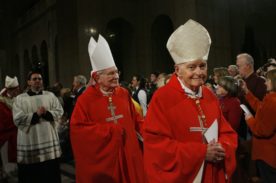By Christopher White, The Tablet’s National Correspondent

NEW YORK – Following Pope Francis’ historic decision to accept the resignation of once Cardinal Theodore McCarrick from the College of Cardinals after allegations of decades-long sex abuse, the head of the United States Conference of Catholic Bishops (USCCB) believes the “Church is suffering from a crisis of sexual morality” and is pledging reform.
“The accusations against Archbishop Theodore McCarrick reveal a grievous moral failure within the Church. They cause bishops anger, sadness, and shame; I know they do in me,” Cardinal Daniel DiNardo, president of the USCCB and Archbishop of Galveston-Houston said in a statement released on Wednesday.
“They compel bishops to ask, as I do, what more could have been done to protect the People of God. Both the abuses themselves, and the fact that they have remained undisclosed for decades, have caused great harm to people’s lives and represent grave moral failures of judgement on the part of Church leaders,” said Cardinal DiNardo.
In June, the Archdiocese of New York announced that an archdiocesan review board had investigated allegations against Cardinal McCarrick dating back to his time as a priest of the archdiocese. The allegations, which were deemed credible, were brought forth by an altar boy who claimed that Cardinal McCarrick molested him on two occasions at New York’s St. Patrick’s Cathedral in the 1970s.
Despite maintaining his innocence, further reports of abuse were brought to light over the past month, including that of an 11-year-old family friend and young seminarians over the period of nearly five decades – ultimately leading to the loss of his red hat and further action, including a likely canonical trial at the Vatican.
Since reports against Cardinal McCarrick first surfaced, U.S. Church leaders have faced particular scrutiny for its policies on punishing bishops implicated in abuse.
The 2002 “Charter for the Protection of Children and Young People,” or the “Dallas Charter” as it is commonly known, was adopted following the systematic cover-up of clerical sex abuse and outlined standards for greater accountability and transparency in the Church’s efforts to protect minors, particularly at the diocesan level, yet it failed to provide a means in which bishops could be held accountable.
In his statement on Wednesday, Cardinal DiNardo said that he had convened the executive committee of the USCCB to begin discussions on an appropriate response and said meetings would continue through November when the full body of U.S. bishops meet in Baltimore for the annual general assembly.
“Archbishop McCarrick will rightly face the judgement of a canonical process at the Holy See regarding the allegations against him, but there are also steps we should be taking as the Church here in the United States,” he said.
Cardinal DiNardo also vowed that the further questions surrounding McCarrick would be fully pursued.
“One way or the other, we are determined to find the truth in this matter,” he added.
“We bishops recognize that a spiritual conversion is needed as we seek to restore the right relationship among us and with the Lord,” he concluded. “Our Church is suffering from a crisis of sexual morality. The way forward must involve learning from past sins.”
